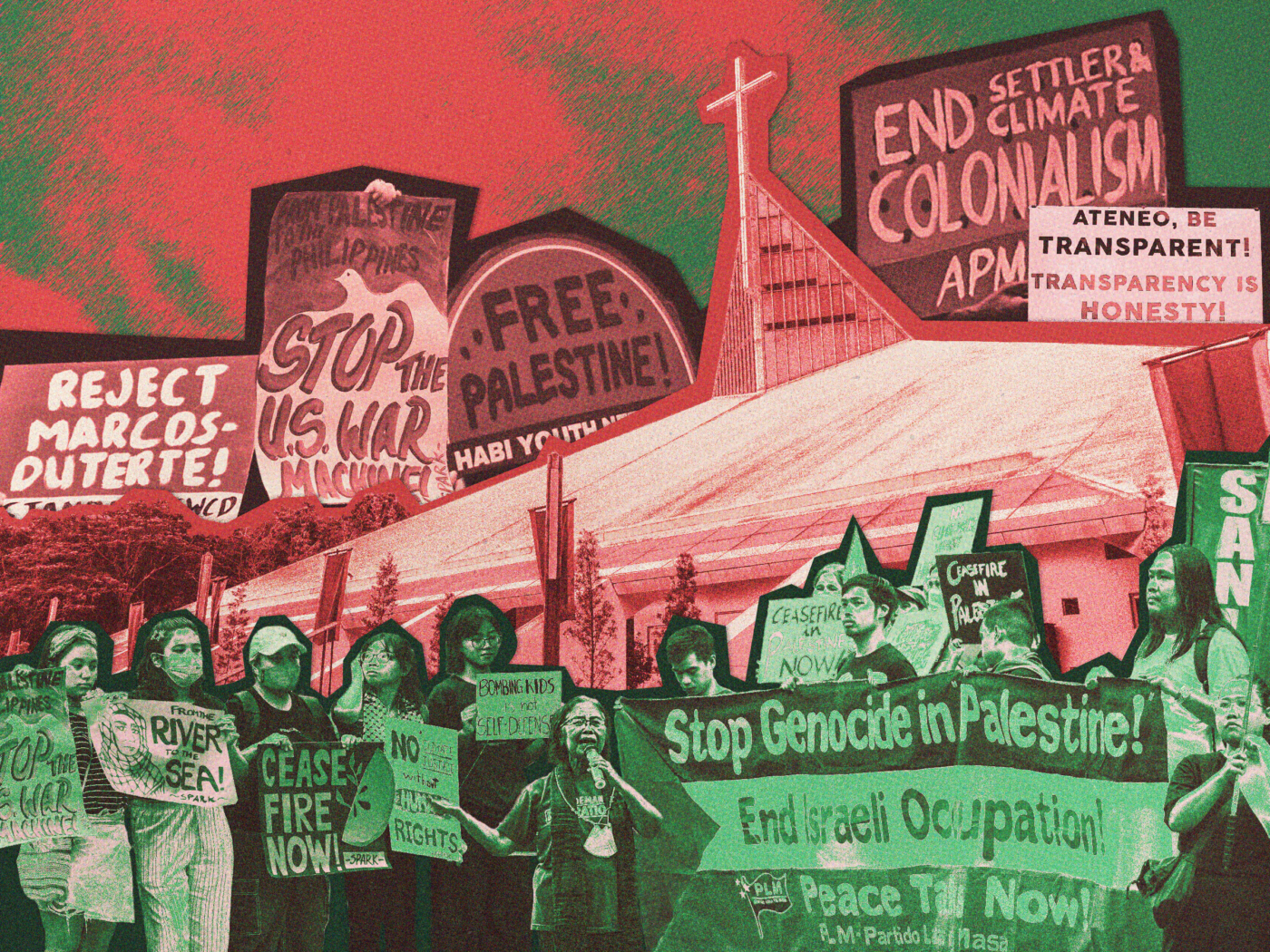AT THE onset of the unfolding Israeli occupation of Palestine last October 2023, more than 40,000 Palestinians have been killed, alongside over a thousand Israelite casualties. Following this, the United Nations recognized Israel’s inhumane invasion of Palestine as an act of genocide.
Since then, youth movements all over the world have eagerly pushed for an immediate ceasefire and offered their support to affected communities.
In the Ateneo, similar strides in the Palestinian liberation movement have been made through the Jesuits’ solidarity statement and organizations like Ateneo 4 Palestine (A4P). With this, the University’s pursuit of social justice transcends into a fight beyond campus grounds and national borders.
Magnetize to magnify
Over the years, the Ateneo has extensively proven itself as a space conducive to the freedom of speech and political thought. From public discussions on current national affairs to rallying with changemakers, Ateneans have actively engaged in sociopolitical issues through the strength of coalitions.
For Sanggunian Commission on Socio-Political Development (CSPD) Commissioner Charmaigne Hazel Matulac, a rich culture of political activism remains prevalent within the Ateneo community. “Students are very proactive in bringing light to concerns. […] Ateneans really do want to engage with the community and encourage others to be more aware,” she explains.
This fervent activism is similarly reflected in the Ateneo community’s support for Palestinian liberation. Last November 11, the One Big Fight for Human Rights and Democracy organized a mobilization at Gate 2.5, calling for an immediate ceasefire and accountability from the United States for funding the Israeli army.
Beyond such initiatives, several organizations from the Ateneo and other universities signed a solidarity letter addressed to the Embassy of the State of Palestine, detailing their support of the country’s liberation.
In the past months, the CSPD also rallied support for Palestine through numerous forums such as the Open Discussions on Genocide & Israeli Occupation and No Pride in Genocide, a joint discussion with the A4P organization that focused on the shared struggles of queer and Palestinian liberation.
Notably, A4P was established by student leaders from different Ateneo universities to urgently consolidate their support for Palestine. A4P Campus Convener Annika Torres notes that the political and historical significance of the holistic Ignatian education across all Ateneo universities played a key factor in creating A4P.
Amid the growing movement, however, Matulac and Torres acknowledge that student efforts may not be enough in the long-run, as further support from the administration is needed. “Letting the world know the stance of a university like [the] Ateneo will make waves, especially on the issue of Palestine,” Torres explains.
While the administration does publicize their stance, Torres observes that political statements such as this often stem from parts of the institution and rarely from the Ateneo as a whole.
Taking a stand
Last April, the Ateneo emphasized their commitment to not remain silent on injustice by releasing a solidarity statement on the “Israel-Gaza conflict.”
In the statement, the University stood with the Jesuit General Curia in Rome, who recognized the still ongoing suffering of the Palestinian people and condemned the “warmongers” for their heinous acts. The Ateneo ended their statement with a call for an immediate ceasefire, the release of hostages, and peace negotiations.
Emphasizing the need for global cooperation against oppression, History Department Associate Professor Antonio Francisco B. De Castro, SJ laments the destruction in Palestine, stressing the inherent dignity of every human life and the “disproportionate” nature of Israel’s attacks.
“What Israel has done in Gaza by no means can be condoned. […] The position of the Jesuits started from Rome [and] basically says, ‘No, this cannot continue,’” he says.
As De Castro recognizes the significance of issuing the statement, he maintains that the statement shows the Ateneo’s “solidarity with people who are suffering and subjected to all sorts of indignities”—an alignment to the Ateneo’s Christian faith and Jesuit formation.
However, Torres deems the Ateneo’s stance in the solidarity statement as inadequate, as it fails to recognize the Israeli occupation as a genocide and express its support toward the Palestinian liberation movement itself.
Torres revealed that other administrations of Atenean campuses even questioned A4P’s accreditation, which escalated to the summoning and profiling of students.
With these developments, Matulac and Torres emphasize that the Ateneo should show a clearer and stronger stance on the Israeli occupation—one that also supports its students who actively participate in mobilizations and initiatives.
Beyond campus borders
Ultimately, the Ateneans’ pursuit of Palestinian liberation comes as a product of the Jesuit education they receive. Grounded in principles of social justice and “persons for and with others,” these values challenge the students to think beyond themselves.
De Castro notes that understanding the interconnectedness of issues is key to fostering global awareness and sparking local action. “One of the things that I’m most proud of about Atenean students [is that they] are trained, educated, and formed to think critically […] [and understand] how problems are interconnected,” he shares.
In the same regard, Torres and Matulac urge the Filipino youth to see the parallels between the Palestinian struggle and the Philippines’ history with colonization and imperialism, drawing on the latter’s experiences of reclaiming sovereignty from past colonizers.
Furthermore, Torres believes that raising awareness about larger struggles is a direct outcome of being part of an Ignatian institution. As such, she encourages students to immerse themselves in political issues on a national and global scale through critical discourse and active engagement with the masses.
“[The] youth has the time [and] energy […] to analyze and pinpoint the shared struggle and universal problem in society. […] They can mobilize, bridge gaps, […] undertake two-way learning to [the] masses, and return the education they receive,” she states.
From the river to Katipunan, the Ateneo community’s relentless dedication to solidarity with the oppressed manifests the strength of Jesuit education, amplifying the call for global attention and action in support of the plight of Palestinians.







